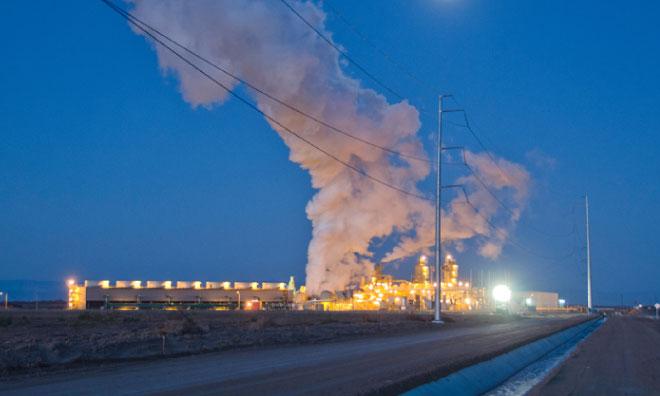Apple's desire to have its Arizona sapphire plant run entirely on renewable energy from day one has spurred the construction of new solar and geothermal power projects in the region, a new report says.
Cupertino, Calif.-based Apple is said to have negotiated directly with Arizona utility SRP to ensure the new facility could be operated without the use of fossil fuel-burning power plants, according to Bloomberg. The additional green energy capacity was one of several concessions — alongside new on-site power infrastructure, expedited permit processing, and financial incentives — made by commercial and governmental entities in the state in order to land Apple's business.
"It's not like getting an extension cord and plugging it in," Mesa, Ariz. mayor Scott Smith told the publication. "These deals live and die many times before they come together."
SRP has signed several new agreements to purchase as much as 75 megawatts of energy from renewable sources in recent months, though it is unclear how much of that is related to the Apple deal. The utility has added power from a 25-megawatt geothermal facility in Beaver County, Utah as well as a 50-megawatt geothermal plant in the Imperial Valley of southern California.
Before its unveiling, the Arizona plant was codenamed Project Cascade
Those agreements are in addition to the more than 700 megawatts of green power SRP already purchases. SRP has not said exactly how much it expects the Apple facility to draw, only that it believes the factory will "add significant electrical load."
The Arizona plant will not be the first Apple facility to depend entirely on renewable energy, as the company moves toward dropping power from fossil fuels entirely.
Apple's Maiden, NC datacenter is powered by two Apple-owned 20-megawatt solar power arrays located adjacent to the datacenter as well as a 10-megawatt fuel cell installation that the company says is the largest non-utility fuel cell installation anywhere in the world. Apple's existing datacenter in Newark, Calif. is served primarily by wind power, while new sites in Reno, Nev. and Prineville, Ore. will take advantage of existing locally-sourced renewable energy.
All together, Apple says that more than 75 percent of power in use at corporate facilities around the world is from renewable sources.
 Shane Cole
Shane Cole







-m.jpg)






 Christine McKee
Christine McKee
 Malcolm Owen
Malcolm Owen
 Marko Zivkovic
Marko Zivkovic

 Andrew Orr
Andrew Orr
 Andrew O'Hara
Andrew O'Hara
 William Gallagher
William Gallagher





-m.jpg)



16 Comments
I thought Apple just had a partnership with some firm to manufacture these sapphire crystal whatever-they-are. This article implies that it will be an Apple owned and operated facility. Is that the case?
as well as a 50-watt geothermal plant in the Imperial Valley of southern California.
Every little bit helps
7.5 percent of my home heating comes from a renewable energy source: wood.
Apple has paid for the facility and the equipment, but another company is running the tech.
I guess the Gorilla (Glass) marketing team won't be able to use the "but it uses more energy to produce than glass so more pollution" argument that I've seen a couple of people use.